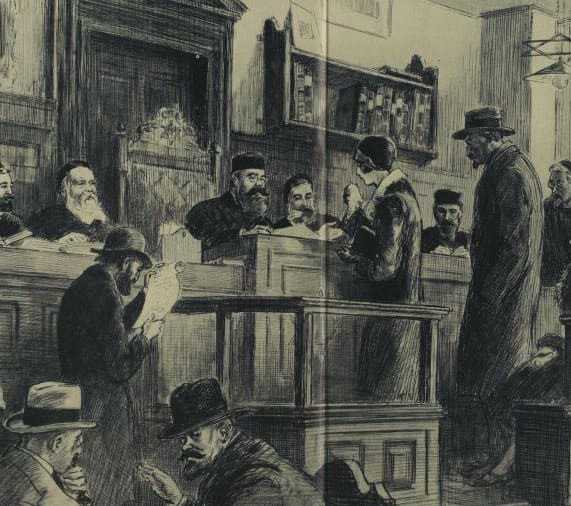One of the most notable features of the Torah system of jurisprudence is its far-reaching insistence on exclusivity. The Torah tells us that disputes should be brought “before them”, meaning the judges; as Rashi writes, we infer from this “before them – and not before a non-Jewish court”. Voluntarily bringing a case to a non-Jewish court is considered a desecration of G^d’s name. (Shemot 21:1 and Rashi’s commentary)
Rav Nachman of Breslav gives the following explanation of the importance of judging according to Torah law:
Of course all of our business dealings should be carried out according to Torah, and not in violation of its laws. But Rav Nachman goes further and writes that these dealings, properly carried out, are actually Torah!
“In truth, all business dealings are Torah. For the rule that “one who exchanges a cow for a donkey [the transaction is complete as soon as one side performs an acquisition] is Torah, so much the more must the actual act be Torah.”
One way of explaining this is to contrast it with the approach of the Sefer HaChinuch. In the rules of monetary judgment, the Chinuch generally states that the mitzva is to judge according to the rule. For example, in mitzva 53 he writes that the mitzva is “to adjudicate the laws of one who opens a pit where it constitutes a hazard”, and that the law applies to those “on whom it is incumbent to judge”.
Rav Nachman’s understanding of the Torah commandment is that a certain outcome should actually obtain – it is a mitzva that the tort feasor should be obligated to pay damages, whether or not any court actually discusses the case.
Therefore, whenever we engage in commerce, buying and selling with integrity and according to the Torah’s mandates, we are actually carrying out the Torah and living it, just as we do when we perform mitzvot.
Conversely, when a person does not fulfill his obligations he has severed his behavior from the realm of Torah. “He has uprooted the statutes which are clothed in commerce, and fallen into commerce itself [without any element of holiness], as if there is no Torah in our business dealings”.
When this happens, the transgressor’s punishment – as well as his rectification – is to bring the case to a Beit Din. The factual inquiry made by the judges is not just a necessary precondition for reaching a just verdict; it serves as a symbolic reenactment of the original transaction, but this time under the auspices of Torah. “Now, it is all transformed into a Torah judgment, for he will certainly have to bring all the details, and even all the thoughts, before the judges… and from this they compose the Torah judgment. Thus he has gone back and made Torah out of his transaction.”
This can help us understand a seemingly cryptic aspect of the laws of Torah judgment – the prohibition to bring a case to a non-Jewish court even if this court judges according to the same rule used by Beit Din (SA CM 26:1). This court may reach the same just outcome that the Beit Din would reach, but without the aspect of actively applying the Torah to the details of our business dealings.
The gemara states that we are judged on whether we have dealt “in faith” (Shabbat 31a). One understanding is that we have to be honest; another is that we have to have faith in G^d. For Rav Nachman these two aspects are essentially the same. When we conduct our business dealings with faith in Hashem, we will be certain to carry them out according to the rules of honesty and fairness which He revealed to us through our Prophets and Sages.
Based on Likutei Moharan I:280
Rabbi Asher Meir is the author of the book Meaning in Mitzvot, distributed by Feldheim. The book provides insights into the inner meaning of our daily practices, following the order of the 221 chapters of the Kitzur Shulchan Aruch.
The words of this author reflect his/her own opinions and do not necessarily represent the official position of the Orthodox Union.
